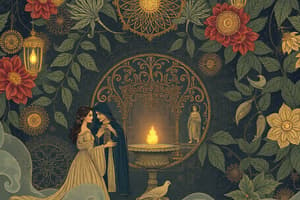Podcast
Questions and Answers
Fernando Amorsolo was the second National Artist in the Philippines.
Fernando Amorsolo was the second National Artist in the Philippines.
False (B)
The National Commission for Culture and the Arts awards the title of National Artist.
The National Commission for Culture and the Arts awards the title of National Artist.
True (A)
Carlos 'Botong' Francisco was born on November 4, 1912.
Carlos 'Botong' Francisco was born on November 4, 1912.
True (A)
The backlighting technique was used by Carlos 'Botong' Francisco in his paintings.
The backlighting technique was used by Carlos 'Botong' Francisco in his paintings.
The highest national honor for contributions to Philippine arts is considered to be the title of National Artist.
The highest national honor for contributions to Philippine arts is considered to be the title of National Artist.
Francisco was known for his expertise in sculpture rather than mural painting.
Francisco was known for his expertise in sculpture rather than mural painting.
Guillermo E. Tolentino was honored as National Artist for Sculpture in 1973.
Guillermo E. Tolentino was honored as National Artist for Sculpture in 1973.
Napoleon V. Abueva is referred to as the Father of Modern Philippine Sculpture.
Napoleon V. Abueva is referred to as the Father of Modern Philippine Sculpture.
Victorio C. Edades is recognized as the Father of Modern Philippine Sculpture.
Victorio C. Edades is recognized as the Father of Modern Philippine Sculpture.
Abueva's 'buoyant sculpture' is meant to be viewed from below the surface of a pool.
Abueva's 'buoyant sculpture' is meant to be viewed from below the surface of a pool.
Victorio C. Edades is known for using bright and cheerful colors in his paintings.
Victorio C. Edades is known for using bright and cheerful colors in his paintings.
Vicente Manansala was associated with an abstract style in his artworks.
Vicente Manansala was associated with an abstract style in his artworks.
Hernando R. Ocampo's masterpiece 'Genesis' was used in the design of a famous theater curtain.
Hernando R. Ocampo's masterpiece 'Genesis' was used in the design of a famous theater curtain.
Vicente Manansala believed that the beauty of art lies in the final product of a painting.
Vicente Manansala believed that the beauty of art lies in the final product of a painting.
Hernando R. Ocampo was primarily known for his portrait paintings.
Hernando R. Ocampo was primarily known for his portrait paintings.
Hernando R. Ocampo primarily focused on realistic themes in his art.
Hernando R. Ocampo primarily focused on realistic themes in his art.
Cesar Legaspi was influential in developing the style known as cubism.
Cesar Legaspi was influential in developing the style known as cubism.
Ocampo's masterpiece 'Genesis' was used in the design of the curtain of the CCP Main Theater.
Ocampo's masterpiece 'Genesis' was used in the design of the curtain of the CCP Main Theater.
Cesar Legaspi was born in 1911.
Cesar Legaspi was born in 1911.
Ocampo's works featured shapes bounded with straight lines painted in dull colors.
Ocampo's works featured shapes bounded with straight lines painted in dull colors.
Hernando R. Ocampo is known for his impressionist paintings.
Hernando R. Ocampo is known for his impressionist paintings.
Cesar Legaspi utilized and refined cubism in his art.
Cesar Legaspi utilized and refined cubism in his art.
The masterpiece 'Genesis' by Ocampo was used for the design of a theater curtain.
The masterpiece 'Genesis' by Ocampo was used for the design of a theater curtain.
Cesar Legaspi was born in 1915.
Cesar Legaspi was born in 1915.
Both artists, Ocampo and Legaspi, focused primarily on realism in their works.
Both artists, Ocampo and Legaspi, focused primarily on realism in their works.
Flashcards are hidden until you start studying
Study Notes
National Artists Overview
- The title of National Artist is the highest honor for Filipino individuals contributing to Philippine arts.
- Awarded by the National Commission for Culture and the Arts and the Cultural Center of the Philippines.
National Artist for Visual Arts
-
Fernando Amorsolo
- First National Artist of the Philippines
- Born May 30, 1892, died April 24, 1972
- Known for the backlighting technique, creating bright and cheerful paintings.
-
Carlos "Botong" Francisco
- Renowned mural painter and revived mural art
- Born November 4, 1912, died March 31, 1969
- Utilized historical events as subjects in his murals.
-
Guillermo E. Tolentino
- National Artist for Sculpture since 1973
- Born July 24, 1890, died July 12, 1976
- Designed the Republic of the Philippines' seal and medals for the Ramon Magsaysay Award.
- Notable work includes the "UP Oblation".
-
Napoleon V. Abueva
- Recognized as the Father of Modern Philippine Sculpture
- Born January 26, 1930
- Known for a variety of sculptures, both representational and modern abstract.
- Innovated "buoyant sculpture," designed to be viewed from pool surfaces.
-
Victorio C. Edades
- Acknowledged as the Father of Modern Philippine Painting
- Born December 23, 1895, died March 7, 1985
- Utilized dark somber colors, focusing on factory workers and townspeople in his art.
Philippine Painters
-
Vicente Manansala
- Famous for realistic themes portrayed through an abstract/cubist style.
- Born January 22, 1910, died August 22, 1981
- Believed in the beauty of the art-making process itself.
-
Hernando R. Ocampo
- Known for abstract paintings employing intense colors and curved lines
- Born April 28, 1911, died December 28, 1978
- His work "Genesis" inspired the curtain design for the Cultural Center of the Philippines Main Theater.
-
Cesar Legaspi
- Noted for refining cubism in his artwork
- Born April 2, 1917, died April 7, 1994
- Employed geometric shapes to break down subjects in his paintings.
Studying That Suits You
Use AI to generate personalized quizzes and flashcards to suit your learning preferences.




